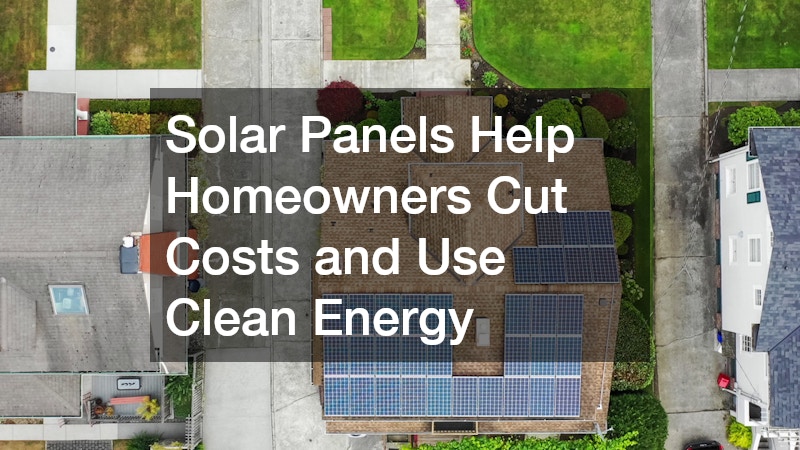Understanding the increasing significance of renewable energy, especially solar panels, is crucial in today’s world. Solar panels not only contribute to a sustainable environment but also offer homeowners a practical way to reduce their energy bills significantly.
As fossil fuel reserves dwindle, renewable energy sources become increasingly important for both economic sustainability and environmental responsibility. Solar panels stand out among these alternatives due to their growing accessibility and efficiency.
This article delves into how solar panels can effectively minimize energy expenses, examining their operation, cost, and impact on property value. Homeowners considering solar energy will find valuable insights into its benefits and implementation.
1. How Do Solar Panels Work?
Understanding Photovoltaic Cells
Photovoltaic cells are the core component of solar panels, capturing sunlight and converting it into electrical energy. When sunlight hits these cells, it excites electrons, creating a flow of electricity that can power household appliances.
This conversion process is known as the photovoltaic effect and is fundamental to solar energy production. With advancements in technology, photovoltaic cells have become more efficient, increasing the energy output from solar panels.
Efficiency improvements have made solar panels a viable investment for reducing household energy costs. As technology continues to evolve, the potential savings on energy bills are expected to grow.
Grid-Tied vs. Off-Grid Systems
Solar energy systems can be configured as grid-tied or off-grid, each offering unique benefits and challenges. Grid-tied systems are connected to the local utility grid, providing a seamless energy supply with potential savings and stability.
Off-grid systems, on the other hand, operate independently from the utility grid, ideal for remote areas where grid access is limited. These systems often require battery storage to ensure a constant power supply, which can initially raise costs but eventually leads to independence from fluctuating energy prices.
Choosing between a grid-tied and off-grid system depends on several factors, including location, energy needs, and budget. Homeowners should consider each option’s long-term financial implications and energy reliability to make an informed decision.
2. What Are the Cost Considerations for Installing Solar Panels?
Initial Investment and Financial Incentives
The initial investment in solar panels can be significant, but various government incentives and rebates are available to help offset these costs. Tax credits, rebates, and financing options make solar energy more attainable for many homeowners.
Programs designed to encourage renewable energy adoption can substantially reduce the financial burden of installation. These incentives not only lower the barrier to entry but also speed up the break-even point for the investment.
Utilizing available incentives, homeowners can reduce the upfront costs and improve the overall affordability of solar panel systems significantly. Awareness of these incentives is key to capitalizing on financial savings.
Long-Term Savings and ROI
While the initial cost of solar panels can be daunting, the long-term savings on energy bills make them a worthwhile investment. Over time, homeowners can see a significant decrease in their monthly energy expenses, enhancing their household budget.
The return on investment (ROI) for solar panels can vary, generally ranging from 5 to 10 years, depending on several factors such as location and energy usage. Once the system pays for itself, the savings continue, increasing the overall value of the investment.
As energy prices fluctuate, the stable cost of solar-generated energy offers peace of mind and financial predictability. This reliability makes the decision to invest in solar panels even more appealing for homeowners seeking long-term savings.
3. How Do Solar Panels Impact Home Value?
Real Estate Market and Solar Integration
Homes equipped with solar panels often experience an increase in value, making them more attractive to potential buyers. The integration of solar technology can boost a property’s market value by offering substantial utility savings.
As more buyers look for energy-efficient homes, properties with solar installations become a desirable option. The higher resale value and quicker selling times associated with these homes reflect their appeal in the market.
Real estate trends indicate a growing preference for sustainable features in homes, including solar panels. This shift underscores the importance of incorporating renewable energy solutions to remain competitive in the housing market.
Buyer Preferences and Energy Efficiency
Today’s homebuyers increasingly prioritize energy efficiency, seeking homes that offer lower operational costs and environmental benefits. Solar panels are a key feature that aligns with these preferences, offering sustainable and cost-effective energy solutions.
The growing awareness of environmental issues has prompted buyers to consider homes with green features, such as solar energy systems. Buyers see these systems as a long-term investment in both their property and the planet.
As demand for energy-efficient homes continues to rise, sellers can leverage solar panels as a unique selling point. The appeal of reduced energy bills and sustainability attracts a broader range of prospective buyers.
Solar panels present a compelling opportunity for homeowners to reduce energy expenses while embracing sustainable energy solutions. The benefits of solar energy extend beyond cost savings, impacting property value and meeting the growing demand for renewable energy sources.
Understanding the operation, installation costs, and market implications of solar panels can help homeowners make informed decisions. Ultimately, the integration of solar panels not only contributes to a greener environment but also enhances financial stability through reduced energy bills.
As more individuals recognize the value of solar energy, its adoption will likely increase, benefiting both the environment and household finances in meaningful ways. The investment in solar panels today promises long-term gains for the future.



